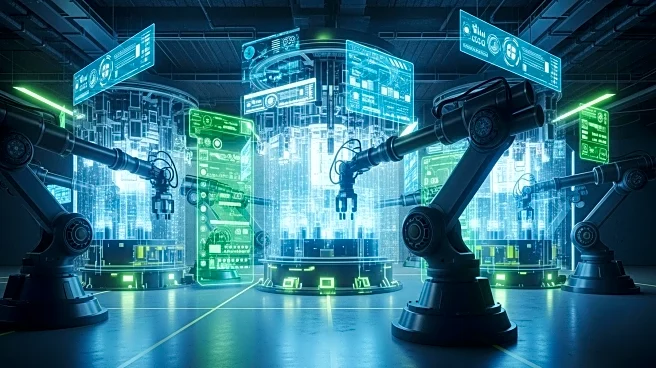What is the story about?
What's Happening?
Manufacturers are increasingly adopting digital transformation technologies to improve operational efficiency, product quality, and customer relations. This transformation involves integrating artificial intelligence, the industrial Internet of Things (IIoT), and cloud computing into manufacturing processes. Solutions consultant Karthik Gopalakrishnan from Yokogawa highlights the importance of these technologies in weaving together organizational processes. Michael Hart from Rockwell Automation emphasizes that digital transformation is not just about technology adoption but also about rethinking decision-making and value movement within businesses. The synergy between people, processes, and technology is crucial as manufacturers face global competition, demand for customization, supply chain disruptions, and sustainability pressures.
Why It's Important?
Digital transformation in manufacturing is vital for maintaining competitiveness in a rapidly evolving global market. By adopting advanced technologies, manufacturers can achieve greater agility and innovation, allowing them to respond quickly to market changes and regulatory expectations. This transformation also enables faster deliveries and greater flexibility in customization, enhancing customer satisfaction. As manufacturers prioritize employee training and culture change, they are more likely to succeed in digital transformation, which can lead to improved product quality and operational efficiency. The integration of digital technologies is essential for addressing challenges such as workforce turnover and sustainability targets.
What's Next?
Manufacturers are expected to continue exploring pilot projects that align with core business goals and offer high impact. Subscription-based SaaS models may be utilized to spread costs over time and reduce IT infrastructure burdens. Companies will likely focus on internal skill development and acquiring new digital talent to support transformation efforts. As digital transformation progresses, manufacturers may face intensified global competition and heightened demand for product customization, requiring ongoing adaptation and innovation.
Beyond the Headlines
The ethical and cultural dimensions of digital transformation in manufacturing include the need for responsible AI usage and data privacy considerations. As companies integrate new technologies, they must ensure that employee roles are not diminished but rather enhanced through skill development and training. Long-term shifts may include increased automation and reliance on data-driven decision-making, potentially altering traditional manufacturing practices.


















